Psychology Assignment: Operant and Classical Conditioning Analysis
VerifiedAdded on 2019/09/30
|6
|1394
|346
Homework Assignment
AI Summary
This psychology assignment delves into the core concepts of operant and classical conditioning, two fundamental theories in the field of behaviorism. The assignment begins with an overview of operant conditioning, as developed by B.F. Skinner, focusing on the law of effect and the role of reinforcement (positive and negative) and punishment in shaping behavior. It provides a practical example of applying operant conditioning principles to a roommate's goal of weight loss, illustrating the use of rewards and consequences to modify behavior. The assignment then contrasts operant conditioning with classical conditioning, pioneered by Ivan Pavlov, highlighting the differences in voluntary versus involuntary behaviors and the roles of stimuli and responses. It discusses the contributions of key figures like Thorndike, Watson, and Skinner, and examines the similarities between the two conditioning types, focusing on their shared basis in the association between behavior and environmental events. The assignment concludes by summarizing the main differences and similarities between operant and classical conditioning. The assignment includes a list of references to support the analysis.
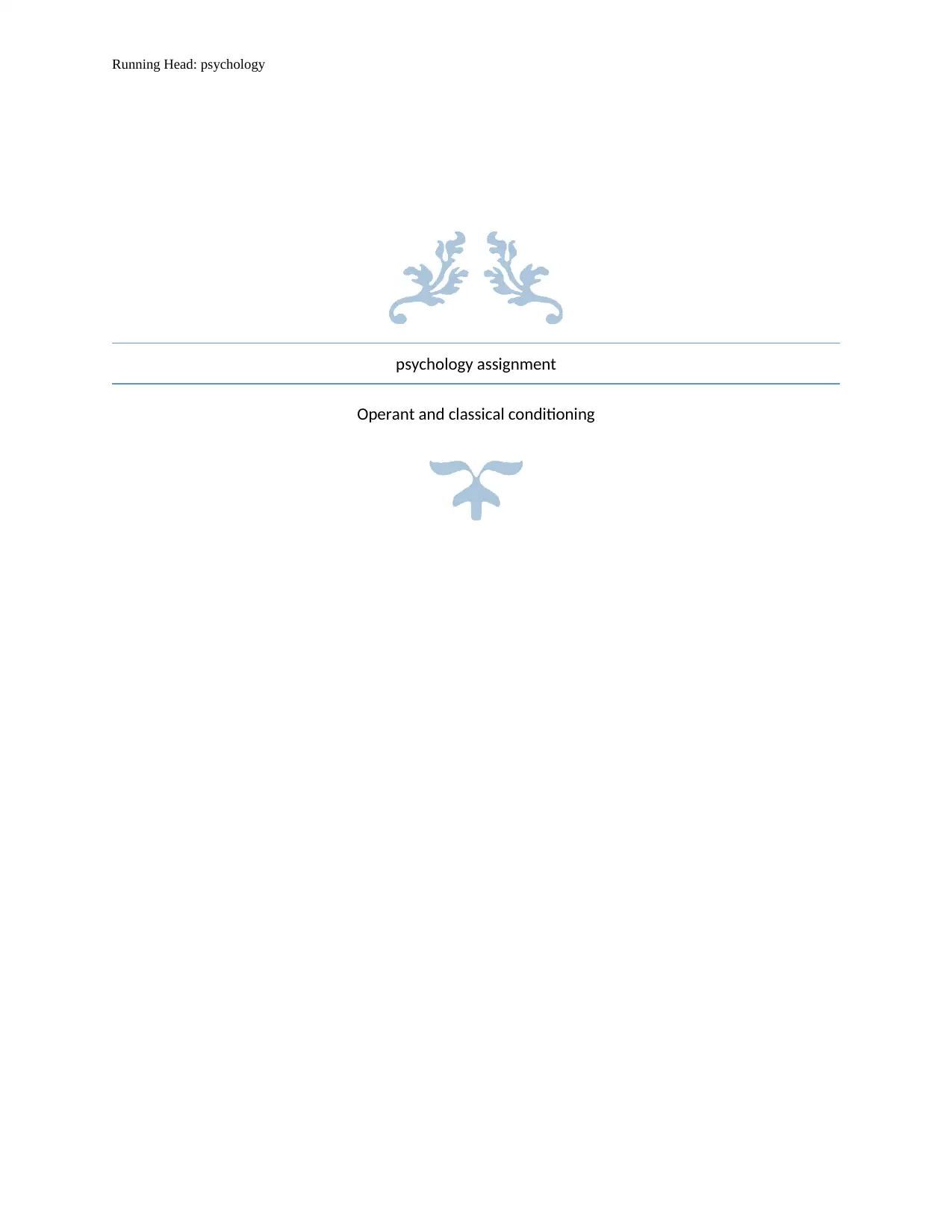
Running Head: psychology
psychology assignment
Operant and classical conditioning
psychology assignment
Operant and classical conditioning
Paraphrase This Document
Need a fresh take? Get an instant paraphrase of this document with our AI Paraphraser
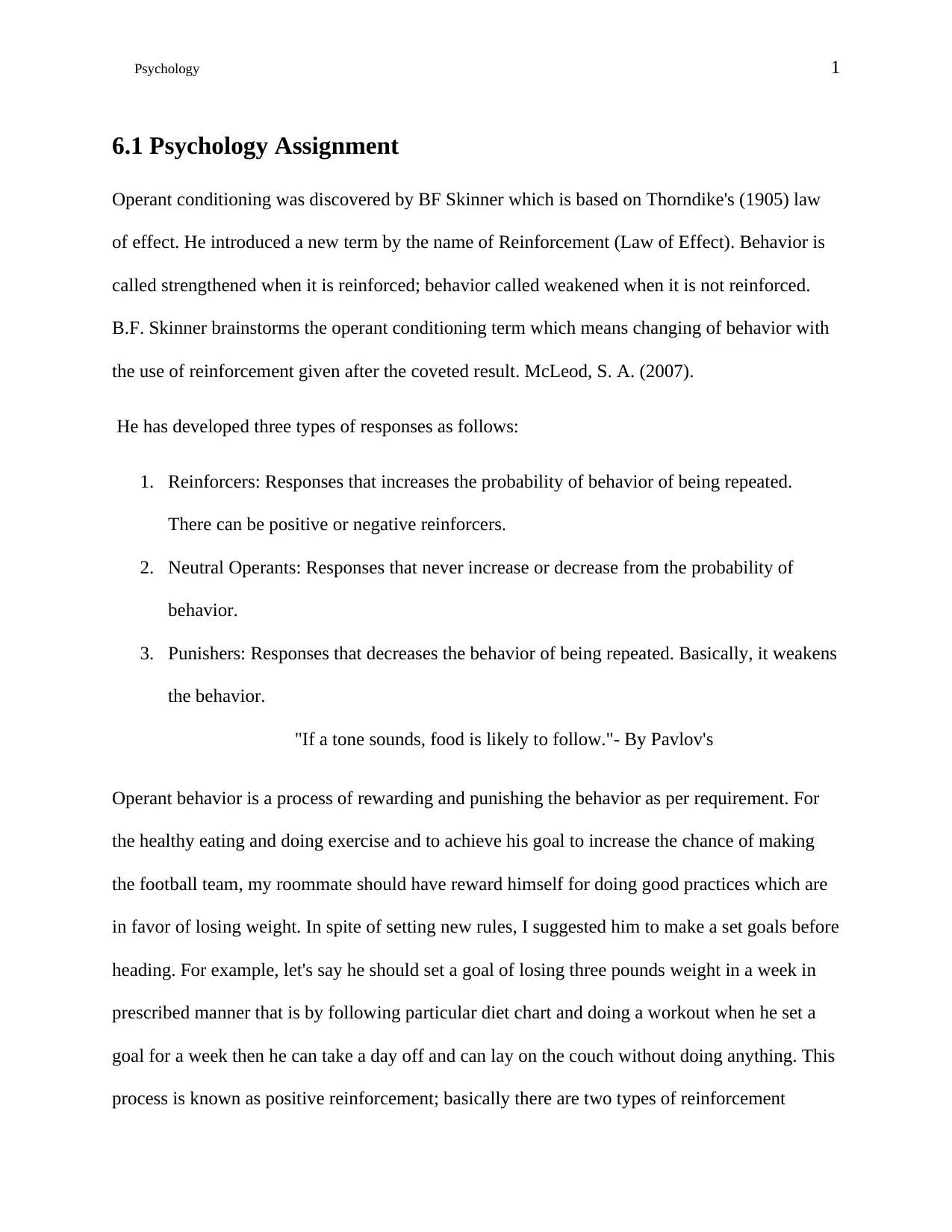
Psychology 1
6.1 Psychology Assignment
Operant conditioning was discovered by BF Skinner which is based on Thorndike's (1905) law
of effect. He introduced a new term by the name of Reinforcement (Law of Effect). Behavior is
called strengthened when it is reinforced; behavior called weakened when it is not reinforced.
B.F. Skinner brainstorms the operant conditioning term which means changing of behavior with
the use of reinforcement given after the coveted result. McLeod, S. A. (2007).
He has developed three types of responses as follows:
1. Reinforcers: Responses that increases the probability of behavior of being repeated.
There can be positive or negative reinforcers.
2. Neutral Operants: Responses that never increase or decrease from the probability of
behavior.
3. Punishers: Responses that decreases the behavior of being repeated. Basically, it weakens
the behavior.
"If a tone sounds, food is likely to follow."- By Pavlov's
Operant behavior is a process of rewarding and punishing the behavior as per requirement. For
the healthy eating and doing exercise and to achieve his goal to increase the chance of making
the football team, my roommate should have reward himself for doing good practices which are
in favor of losing weight. In spite of setting new rules, I suggested him to make a set goals before
heading. For example, let's say he should set a goal of losing three pounds weight in a week in
prescribed manner that is by following particular diet chart and doing a workout when he set a
goal for a week then he can take a day off and can lay on the couch without doing anything. This
process is known as positive reinforcement; basically there are two types of reinforcement
6.1 Psychology Assignment
Operant conditioning was discovered by BF Skinner which is based on Thorndike's (1905) law
of effect. He introduced a new term by the name of Reinforcement (Law of Effect). Behavior is
called strengthened when it is reinforced; behavior called weakened when it is not reinforced.
B.F. Skinner brainstorms the operant conditioning term which means changing of behavior with
the use of reinforcement given after the coveted result. McLeod, S. A. (2007).
He has developed three types of responses as follows:
1. Reinforcers: Responses that increases the probability of behavior of being repeated.
There can be positive or negative reinforcers.
2. Neutral Operants: Responses that never increase or decrease from the probability of
behavior.
3. Punishers: Responses that decreases the behavior of being repeated. Basically, it weakens
the behavior.
"If a tone sounds, food is likely to follow."- By Pavlov's
Operant behavior is a process of rewarding and punishing the behavior as per requirement. For
the healthy eating and doing exercise and to achieve his goal to increase the chance of making
the football team, my roommate should have reward himself for doing good practices which are
in favor of losing weight. In spite of setting new rules, I suggested him to make a set goals before
heading. For example, let's say he should set a goal of losing three pounds weight in a week in
prescribed manner that is by following particular diet chart and doing a workout when he set a
goal for a week then he can take a day off and can lay on the couch without doing anything. This
process is known as positive reinforcement; basically there are two types of reinforcement
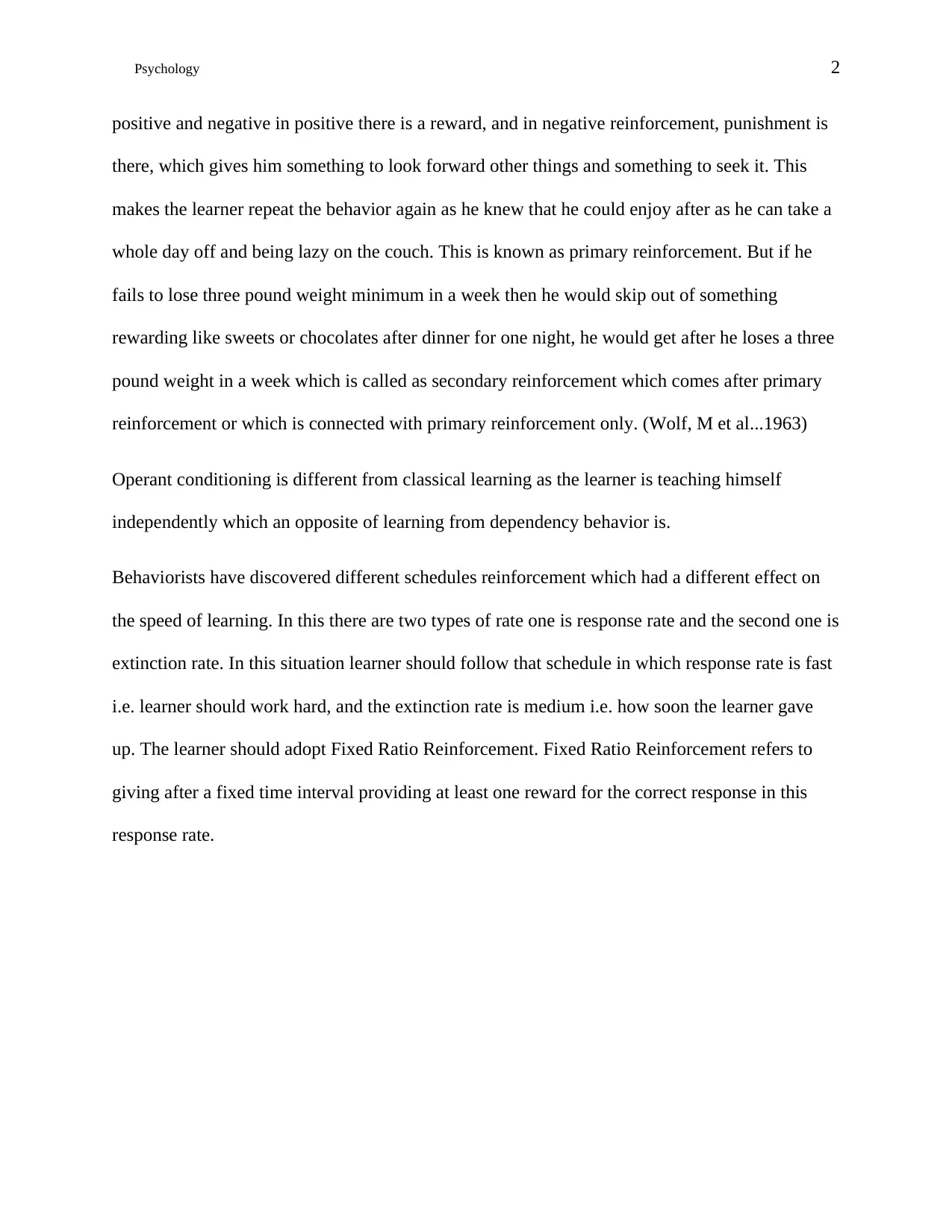
Psychology 2
positive and negative in positive there is a reward, and in negative reinforcement, punishment is
there, which gives him something to look forward other things and something to seek it. This
makes the learner repeat the behavior again as he knew that he could enjoy after as he can take a
whole day off and being lazy on the couch. This is known as primary reinforcement. But if he
fails to lose three pound weight minimum in a week then he would skip out of something
rewarding like sweets or chocolates after dinner for one night, he would get after he loses a three
pound weight in a week which is called as secondary reinforcement which comes after primary
reinforcement or which is connected with primary reinforcement only. (Wolf, M et al...1963)
Operant conditioning is different from classical learning as the learner is teaching himself
independently which an opposite of learning from dependency behavior is.
Behaviorists have discovered different schedules reinforcement which had a different effect on
the speed of learning. In this there are two types of rate one is response rate and the second one is
extinction rate. In this situation learner should follow that schedule in which response rate is fast
i.e. learner should work hard, and the extinction rate is medium i.e. how soon the learner gave
up. The learner should adopt Fixed Ratio Reinforcement. Fixed Ratio Reinforcement refers to
giving after a fixed time interval providing at least one reward for the correct response in this
response rate.
positive and negative in positive there is a reward, and in negative reinforcement, punishment is
there, which gives him something to look forward other things and something to seek it. This
makes the learner repeat the behavior again as he knew that he could enjoy after as he can take a
whole day off and being lazy on the couch. This is known as primary reinforcement. But if he
fails to lose three pound weight minimum in a week then he would skip out of something
rewarding like sweets or chocolates after dinner for one night, he would get after he loses a three
pound weight in a week which is called as secondary reinforcement which comes after primary
reinforcement or which is connected with primary reinforcement only. (Wolf, M et al...1963)
Operant conditioning is different from classical learning as the learner is teaching himself
independently which an opposite of learning from dependency behavior is.
Behaviorists have discovered different schedules reinforcement which had a different effect on
the speed of learning. In this there are two types of rate one is response rate and the second one is
extinction rate. In this situation learner should follow that schedule in which response rate is fast
i.e. learner should work hard, and the extinction rate is medium i.e. how soon the learner gave
up. The learner should adopt Fixed Ratio Reinforcement. Fixed Ratio Reinforcement refers to
giving after a fixed time interval providing at least one reward for the correct response in this
response rate.
⊘ This is a preview!⊘
Do you want full access?
Subscribe today to unlock all pages.

Trusted by 1+ million students worldwide
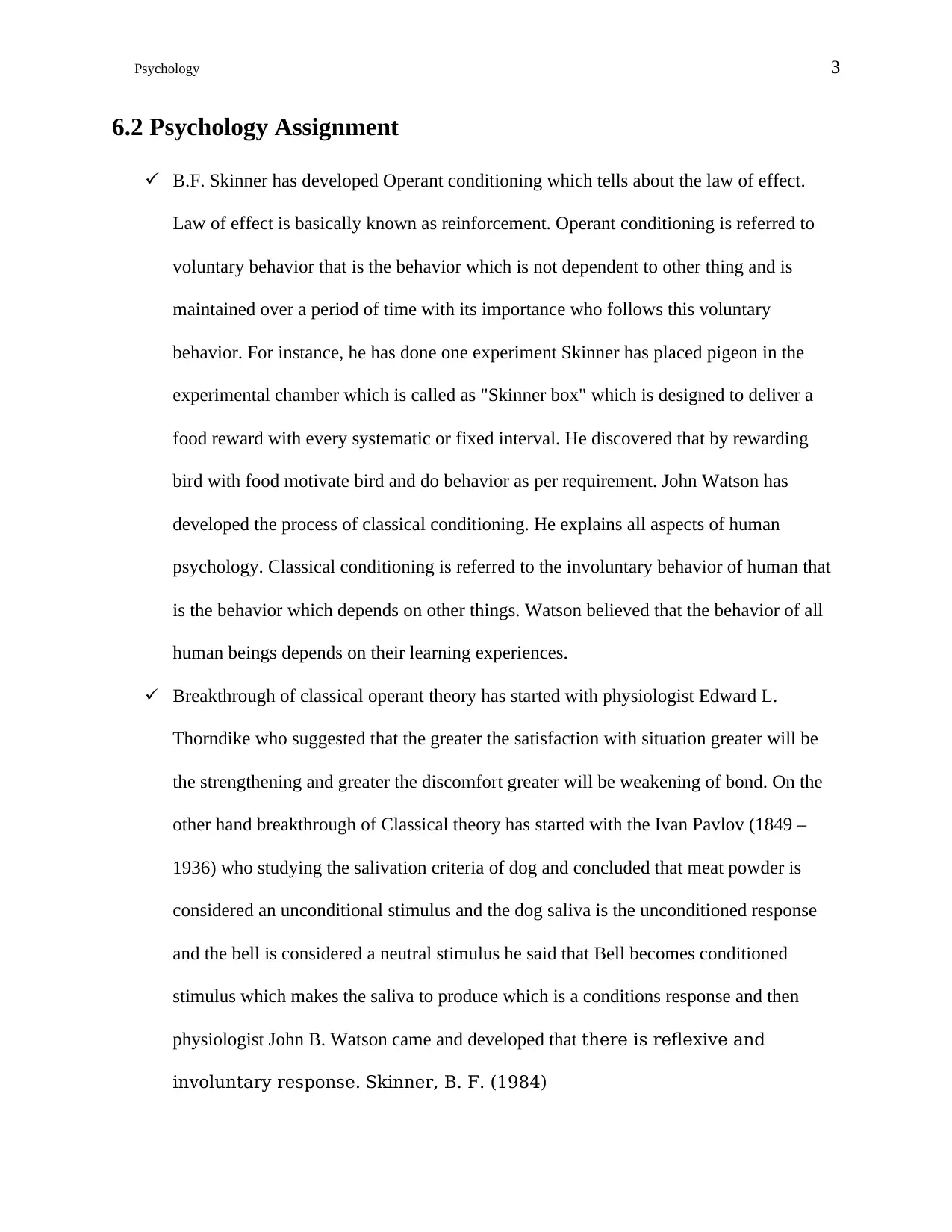
Psychology 3
6.2 Psychology Assignment
B.F. Skinner has developed Operant conditioning which tells about the law of effect.
Law of effect is basically known as reinforcement. Operant conditioning is referred to
voluntary behavior that is the behavior which is not dependent to other thing and is
maintained over a period of time with its importance who follows this voluntary
behavior. For instance, he has done one experiment Skinner has placed pigeon in the
experimental chamber which is called as "Skinner box" which is designed to deliver a
food reward with every systematic or fixed interval. He discovered that by rewarding
bird with food motivate bird and do behavior as per requirement. John Watson has
developed the process of classical conditioning. He explains all aspects of human
psychology. Classical conditioning is referred to the involuntary behavior of human that
is the behavior which depends on other things. Watson believed that the behavior of all
human beings depends on their learning experiences.
Breakthrough of classical operant theory has started with physiologist Edward L.
Thorndike who suggested that the greater the satisfaction with situation greater will be
the strengthening and greater the discomfort greater will be weakening of bond. On the
other hand breakthrough of Classical theory has started with the Ivan Pavlov (1849 –
1936) who studying the salivation criteria of dog and concluded that meat powder is
considered an unconditional stimulus and the dog saliva is the unconditioned response
and the bell is considered a neutral stimulus he said that Bell becomes conditioned
stimulus which makes the saliva to produce which is a conditions response and then
physiologist John B. Watson came and developed that there is reflexive and
involuntary response. Skinner, B. F. (1984)
6.2 Psychology Assignment
B.F. Skinner has developed Operant conditioning which tells about the law of effect.
Law of effect is basically known as reinforcement. Operant conditioning is referred to
voluntary behavior that is the behavior which is not dependent to other thing and is
maintained over a period of time with its importance who follows this voluntary
behavior. For instance, he has done one experiment Skinner has placed pigeon in the
experimental chamber which is called as "Skinner box" which is designed to deliver a
food reward with every systematic or fixed interval. He discovered that by rewarding
bird with food motivate bird and do behavior as per requirement. John Watson has
developed the process of classical conditioning. He explains all aspects of human
psychology. Classical conditioning is referred to the involuntary behavior of human that
is the behavior which depends on other things. Watson believed that the behavior of all
human beings depends on their learning experiences.
Breakthrough of classical operant theory has started with physiologist Edward L.
Thorndike who suggested that the greater the satisfaction with situation greater will be
the strengthening and greater the discomfort greater will be weakening of bond. On the
other hand breakthrough of Classical theory has started with the Ivan Pavlov (1849 –
1936) who studying the salivation criteria of dog and concluded that meat powder is
considered an unconditional stimulus and the dog saliva is the unconditioned response
and the bell is considered a neutral stimulus he said that Bell becomes conditioned
stimulus which makes the saliva to produce which is a conditions response and then
physiologist John B. Watson came and developed that there is reflexive and
involuntary response. Skinner, B. F. (1984)
Paraphrase This Document
Need a fresh take? Get an instant paraphrase of this document with our AI Paraphraser
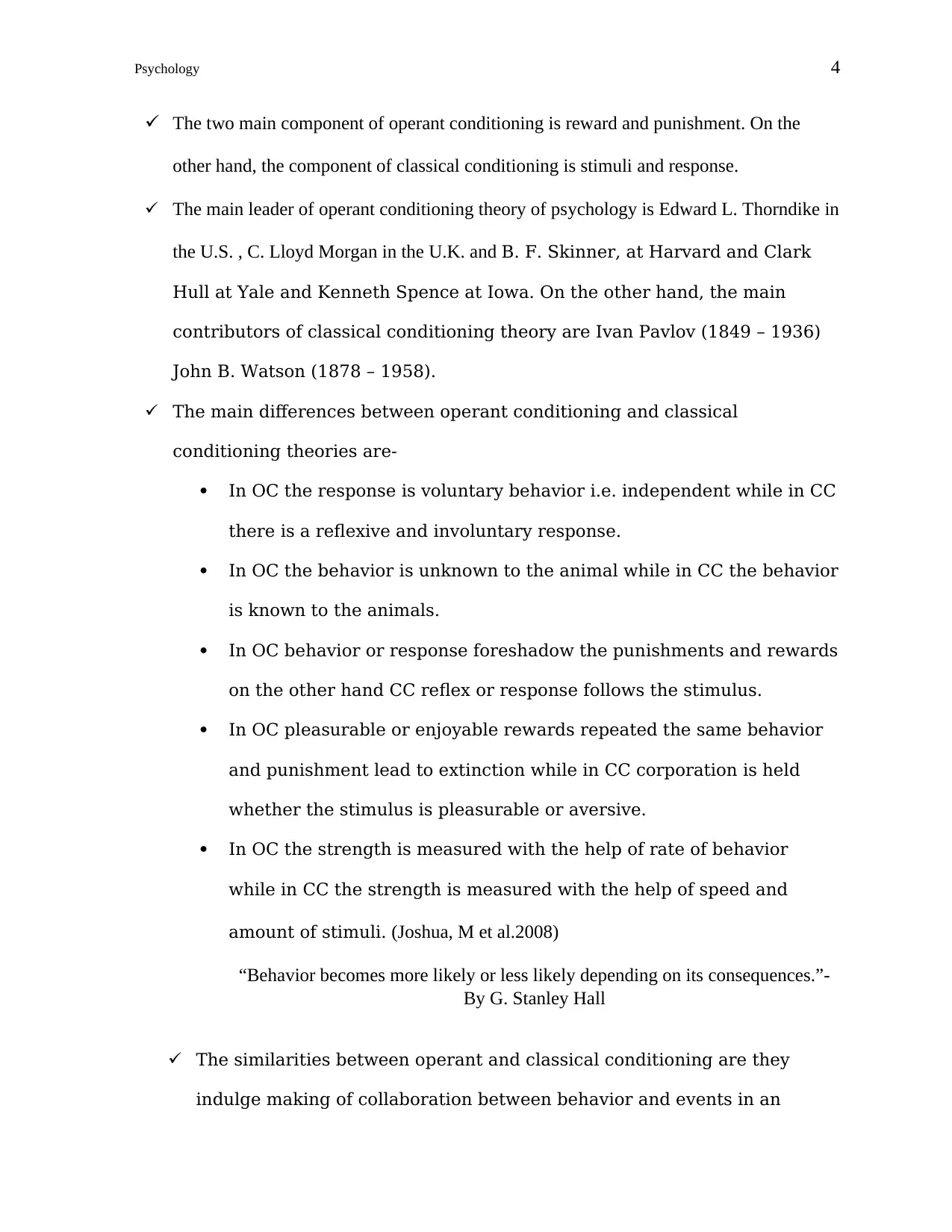
Psychology 4
The two main component of operant conditioning is reward and punishment. On the
other hand, the component of classical conditioning is stimuli and response.
The main leader of operant conditioning theory of psychology is Edward L. Thorndike in
the U.S. , C. Lloyd Morgan in the U.K. and B. F. Skinner, at Harvard and Clark
Hull at Yale and Kenneth Spence at Iowa. On the other hand, the main
contributors of classical conditioning theory are Ivan Pavlov (1849 – 1936)
John B. Watson (1878 – 1958).
The main differences between operant conditioning and classical
conditioning theories are-
In OC the response is voluntary behavior i.e. independent while in CC
there is a reflexive and involuntary response.
In OC the behavior is unknown to the animal while in CC the behavior
is known to the animals.
In OC behavior or response foreshadow the punishments and rewards
on the other hand CC reflex or response follows the stimulus.
In OC pleasurable or enjoyable rewards repeated the same behavior
and punishment lead to extinction while in CC corporation is held
whether the stimulus is pleasurable or aversive.
In OC the strength is measured with the help of rate of behavior
while in CC the strength is measured with the help of speed and
amount of stimuli. (Joshua, M et al.2008)
“Behavior becomes more likely or less likely depending on its consequences.”-
By G. Stanley Hall
The similarities between operant and classical conditioning are they
indulge making of collaboration between behavior and events in an
The two main component of operant conditioning is reward and punishment. On the
other hand, the component of classical conditioning is stimuli and response.
The main leader of operant conditioning theory of psychology is Edward L. Thorndike in
the U.S. , C. Lloyd Morgan in the U.K. and B. F. Skinner, at Harvard and Clark
Hull at Yale and Kenneth Spence at Iowa. On the other hand, the main
contributors of classical conditioning theory are Ivan Pavlov (1849 – 1936)
John B. Watson (1878 – 1958).
The main differences between operant conditioning and classical
conditioning theories are-
In OC the response is voluntary behavior i.e. independent while in CC
there is a reflexive and involuntary response.
In OC the behavior is unknown to the animal while in CC the behavior
is known to the animals.
In OC behavior or response foreshadow the punishments and rewards
on the other hand CC reflex or response follows the stimulus.
In OC pleasurable or enjoyable rewards repeated the same behavior
and punishment lead to extinction while in CC corporation is held
whether the stimulus is pleasurable or aversive.
In OC the strength is measured with the help of rate of behavior
while in CC the strength is measured with the help of speed and
amount of stimuli. (Joshua, M et al.2008)
“Behavior becomes more likely or less likely depending on its consequences.”-
By G. Stanley Hall
The similarities between operant and classical conditioning are they
indulge making of collaboration between behavior and events in an
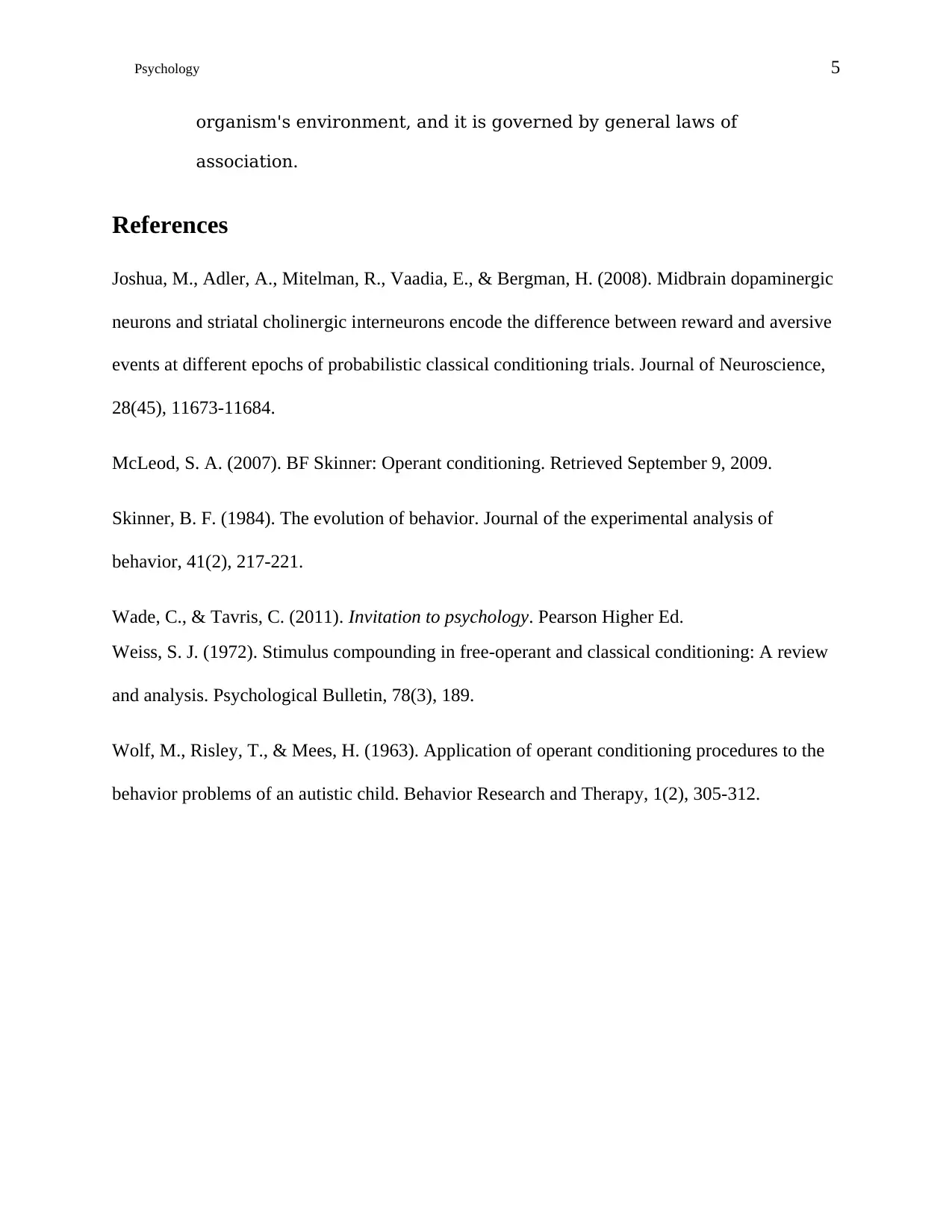
Psychology 5
organism's environment, and it is governed by general laws of
association.
References
Joshua, M., Adler, A., Mitelman, R., Vaadia, E., & Bergman, H. (2008). Midbrain dopaminergic
neurons and striatal cholinergic interneurons encode the difference between reward and aversive
events at different epochs of probabilistic classical conditioning trials. Journal of Neuroscience,
28(45), 11673-11684.
McLeod, S. A. (2007). BF Skinner: Operant conditioning. Retrieved September 9, 2009.
Skinner, B. F. (1984). The evolution of behavior. Journal of the experimental analysis of
behavior, 41(2), 217-221.
Wade, C., & Tavris, C. (2011). Invitation to psychology. Pearson Higher Ed.
Weiss, S. J. (1972). Stimulus compounding in free-operant and classical conditioning: A review
and analysis. Psychological Bulletin, 78(3), 189.
Wolf, M., Risley, T., & Mees, H. (1963). Application of operant conditioning procedures to the
behavior problems of an autistic child. Behavior Research and Therapy, 1(2), 305-312.
organism's environment, and it is governed by general laws of
association.
References
Joshua, M., Adler, A., Mitelman, R., Vaadia, E., & Bergman, H. (2008). Midbrain dopaminergic
neurons and striatal cholinergic interneurons encode the difference between reward and aversive
events at different epochs of probabilistic classical conditioning trials. Journal of Neuroscience,
28(45), 11673-11684.
McLeod, S. A. (2007). BF Skinner: Operant conditioning. Retrieved September 9, 2009.
Skinner, B. F. (1984). The evolution of behavior. Journal of the experimental analysis of
behavior, 41(2), 217-221.
Wade, C., & Tavris, C. (2011). Invitation to psychology. Pearson Higher Ed.
Weiss, S. J. (1972). Stimulus compounding in free-operant and classical conditioning: A review
and analysis. Psychological Bulletin, 78(3), 189.
Wolf, M., Risley, T., & Mees, H. (1963). Application of operant conditioning procedures to the
behavior problems of an autistic child. Behavior Research and Therapy, 1(2), 305-312.
⊘ This is a preview!⊘
Do you want full access?
Subscribe today to unlock all pages.

Trusted by 1+ million students worldwide
1 out of 6
Related Documents
Your All-in-One AI-Powered Toolkit for Academic Success.
+13062052269
info@desklib.com
Available 24*7 on WhatsApp / Email
![[object Object]](/_next/static/media/star-bottom.7253800d.svg)
Unlock your academic potential
Copyright © 2020–2026 A2Z Services. All Rights Reserved. Developed and managed by ZUCOL.





